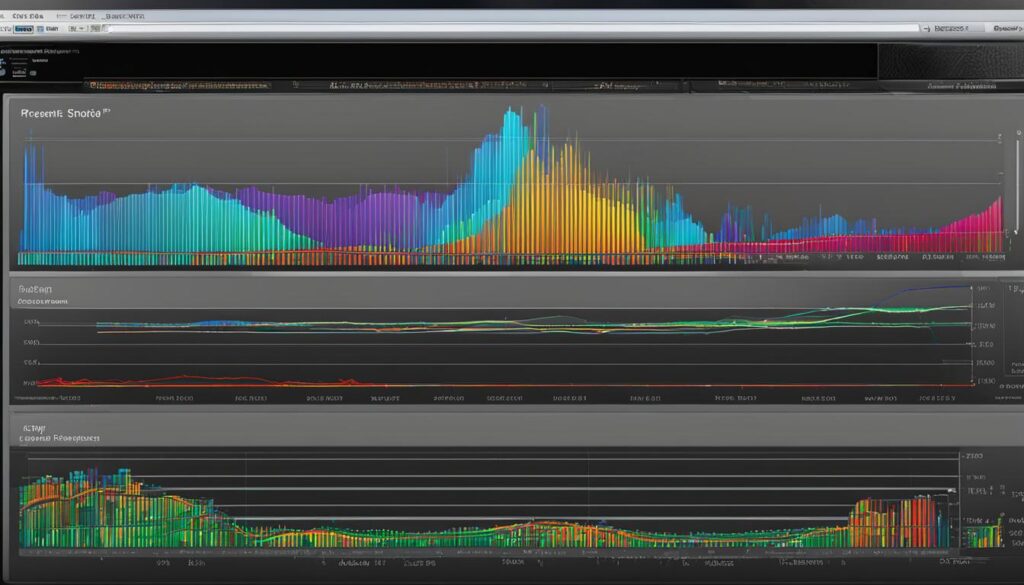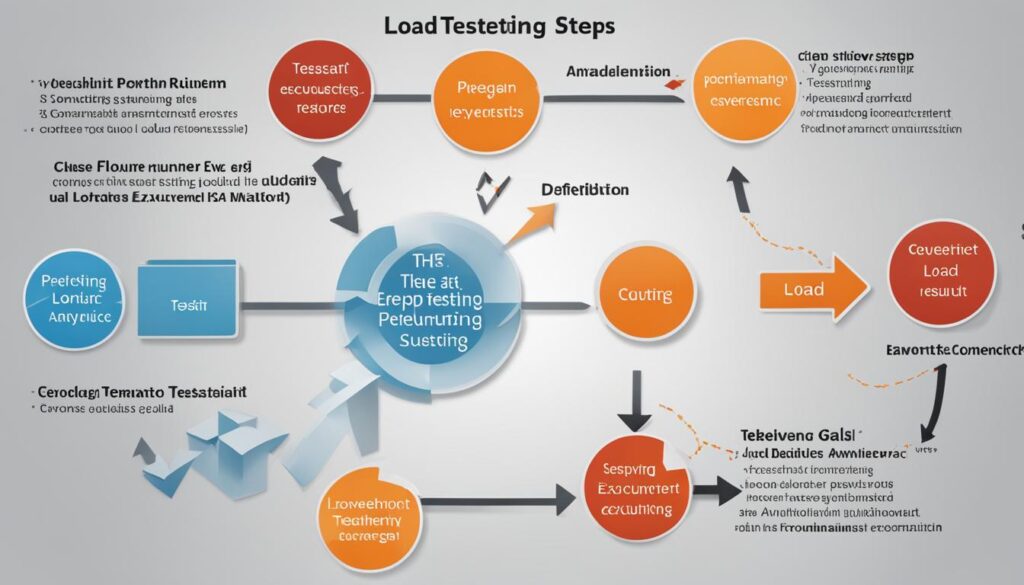Are you looking to enhance your expertise in load testing and performance evaluation? Look no further – our HP LoadRunner training programs are the solution you’ve been seeking. Our comprehensive online training courses cover all aspects of performance testing with HP LoadRunner, a leading load testing tool in the industry.
In our training courses, you will learn how to automate performance and load tests using HP LoadRunner’s powerful features. From recording for the web to replay, transactions, parameters, verification, and more, we will guide you through the entire process, ensuring you gain expertise in using this essential tool for performance testing.
Our HP LoadRunner training courses are designed for quality assurance engineers, performance engineers, and new users of LoadRunner. Whether you are a beginner or have some basic knowledge of LoadRunner, our courses will take you to the next level with hands-on training and practical assignments.
Key Takeaways:
- Enhance your skills in load testing and performance analysis with HP LoadRunner training
- Learn how to automate performance and load tests using LoadRunner’s features
- Suitable for quality assurance engineers, performance engineers, and new users of LoadRunner
- Hands-on training and practical assignments to ensure comprehensive understanding
- Take your career in performance testing to new heights
HP LoadRunner Training Course Details
Our HP LoadRunner training course offered by H2K Infosys provides comprehensive coverage on all LoadRunner-related topics, from basic to advanced. During this training, you will gain in-depth knowledge and hands-on experience in load testing and performance analysis using LoadRunner.
Here are some of the key topics covered in our LoadRunner training:
- Recording for the web: Learn how to record and replay scripts, capture transactions, and handle parameters.
- Scripting techniques: Discover advanced scripting techniques to enhance the accuracy and efficiency of your load tests.
- Scenario execution: Understand how to configure and execute load testing scenarios to simulate real-world user behavior.
- Performance monitoring: Learn how to monitor system performance during load tests and analyze the results to identify bottlenecks.
- Results analysis: Dive into the detailed analysis of LoadRunner test results to gain valuable insights into application performance.
Our training program includes various learning resources and features to ensure a comprehensive and interactive learning experience:
- Hands-on training: Get practical experience with real-life examples and assignments to reinforce your understanding of LoadRunner.
- Study material: Access study materials for further learning and research to expand your LoadRunner knowledge.
- Live teacher-led classes: Attend live classes conducted by experienced instructors who will provide guidance and answer your queries.
- Certification and job placement guidance: Receive guidance and support to obtain LoadRunner certification and enhance your job prospects.
- Resume and interview tips: Learn valuable tips to craft a standout resume and excel in LoadRunner-related job interviews.
- Mentoring: Benefit from personalized mentoring and support throughout your LoadRunner training journey.
“The instructor’s expertise and the practical assignments provided in the course were invaluable. I gained a deep understanding of LoadRunner and its application in performance testing.” – Previous participant
| Course Features | Details |
|---|---|
| Course Duration | 8 weeks |
| Training Mode | Online |
| Prerequisites | Basic knowledge of LoadRunner and a high-level understanding of the web and client/server environment |
| Instructor-led Classes | Yes |
| Hands-on Exercises | Yes |
| Study Material | Provided |
| Certification Guidance | Yes |
| Job Placement Assistance | Yes |
Benefits of HP LoadRunner
When it comes to load testing and performance analysis, HP LoadRunner offers a range of benefits that can help businesses ensure the optimal performance of their applications. Whether it’s identifying performance bottlenecks or providing detailed reports with advanced analysis features, LoadRunner is a reliable and powerful tool. By integrating with diagnostic tools like HP SiteScope and HP Diagnostic, LoadRunner enables users to diagnose performance issues effectively. Let’s explore some of the key benefits of using HP LoadRunner:
- Efficient Performance Testing: LoadRunner allows users to simulate thousands of virtual users, enabling comprehensive performance testing of applications. With this capability, businesses can evaluate the behavior of their applications under different loads and identify potential performance bottlenecks that may impact user experience.
- User-Friendly Monitoring and Analysis: LoadRunner provides a user-friendly interface for monitoring and analyzing application performance. Through intuitive dashboards and graphs, users can easily track important performance metrics and gain actionable insights to optimize their applications.
- Support for Various Protocols: LoadRunner supports a wide range of protocols, making it a versatile tool for testing applications built on different technologies. Whether it’s web, mobile, or client-server applications, LoadRunner offers the flexibility to accommodate diverse testing requirements.
- Facilitates Performance Regression Testing: LoadRunner simplifies performance regression testing by allowing users to compare test results across different versions of an application. This ensures that any performance degradation or improvement can be accurately identified and addressed.
While the features and capabilities of HP LoadRunner are undoubtedly powerful, it’s important for users to gain practical experience and expertise in using the tool effectively. Hands-on LoadRunner training can equip participants with the necessary skills to navigate LoadRunner’s features, handle performance testing challenges, and optimize application performance.

HP LoadRunner Course Curriculum
Our HP LoadRunner training curriculum is designed to equip participants with the necessary skills and knowledge to effectively utilize LoadRunner for load testing and performance analysis. The comprehensive curriculum focuses on various aspects of LoadRunner, including scripting, scenarios, and performance monitoring.
Scripting
In this section, participants will learn how to record and replay scripts using LoadRunner. They will also gain insights into advanced scripting techniques, such as manual correlation and auto correlation during recording. Our instructors provide a hands-on tutorial that covers script view and offers practical examples to reinforce the learning experience.
Scenarios
LoadRunner scenarios play a crucial role in simulating realistic user loads for performance testing. Our training curriculum covers the configuration and scheduling of scenarios, allowing participants to gain a deep understanding of how to set up and execute different types of scenarios. We focus on practical exercises to enhance participants’ scenario-building skills.
Performance Monitors
Monitoring the performance of an application during load testing is essential for identifying bottlenecks and optimizing its efficiency. Our curriculum covers the use of performance monitors in LoadRunner, enabling participants to track and analyze critical performance metrics. Participants will gain hands-on experience in working with performance monitors and interpreting the results.
“The HP LoadRunner training curriculum provides a comprehensive guide to mastering the intricacies of LoadRunner. With a focus on scripting, scenarios, and performance monitoring, participants can develop a solid foundation in load testing and performance analysis.”
By providing in-depth tutorials, hands-on exercises, and practical examples, our HP LoadRunner training curriculum ensures that participants gain a holistic understanding of LoadRunner and its functionalities. Through this comprehensive training, participants will be well-equipped to handle the challenges of load testing and performance analysis in real-world scenarios.
| Curriculum Highlights |
|---|
| Recording and replaying scripts |
| Configuring and scheduling scenarios |
| Working with performance monitors |
| Analyzing test results |
HP LoadRunner Training Audience and Prerequisites
At H2K Infosys, we offer HP LoadRunner training courses that cater to a wide range of professionals in the software testing field. Our comprehensive training is suitable for:
- Quality assurance engineers
- Performance engineers
- New users of LoadRunner who need to load test their applications
The course covers both the technical aspects of load testing, such as networks, response times, and protocols, as well as the business-focused forecasting of system success and availability. By participating in our LoadRunner training, you will gain the knowledge and skills necessary to analyze, optimize, and improve the performance of your applications.
Prerequisites
To fully benefit from our LoadRunner training, it is recommended that participants have:
- Basic knowledge of LoadRunner – Understanding the fundamentals of LoadRunner will help you grasp the advanced concepts covered in the training.
- High-level understanding of the web and client/server environment – Familiarity with web technologies and client/server architectures will support your understanding of LoadRunner’s functionalities.
By meeting these prerequisites, you will be ready to dive into our comprehensive LoadRunner training program and enhance your skills in load testing and performance analysis.
| Target Audience | Prerequisites |
|---|---|
| Quality assurance engineers | Basic knowledge of LoadRunner High-level understanding of the web and client/server environment |
| Performance engineers | Basic knowledge of LoadRunner High-level understanding of the web and client/server environment |
| New users of LoadRunner | Basic knowledge of LoadRunner High-level understanding of the web and client/server environment |

Please note that the prerequisites ensure that participants have a strong foundation to fully benefit from the LoadRunner training; however, if you don’t meet all the prerequisites, don’t worry. Our trainers will guide you through the training to ensure you understand the concepts and can apply them effectively.
HP LoadRunner Training Reviews
At H2K Infosys, we are proud to share the positive feedback and reviews we have received from participants who have completed our HP LoadRunner training. Their testimonials highlight the quality of our training programs and the expertise of our instructors.
“The instructor’s knowledge and teaching skills were exceptional. The LoadRunner training sessions were filled with detailed explanations, allowing me to grasp the concepts easily. The instructor encouraged us to ask questions and provided additional support whenever we needed it. I highly recommend this course to anyone looking to enhance their LoadRunner skills.”
– Michael Thompson, Performance Engineer
“The practical assignments and real-life examples provided during the training were invaluable. They helped me understand how LoadRunner works in real-world scenarios and enhanced my problem-solving skills. The hands-on approach of this course has made me confident in using LoadRunner in my day-to-day work.”
– Sarah Anderson, Quality Assurance Engineer
We have consistently received feedback praising our instructor’s expertise, detailed explanations, and the practical assignments offered in our LoadRunner training. Participants appreciate the opportunity to ask questions, receive additional support, and gain a deep understanding of LoadRunner concepts.
These reviews reflect the high level of satisfaction among our participants, and we are committed to maintaining the quality and effectiveness of our training programs.

| Participant | Feedback |
|---|---|
| Michael Thompson | The instructor’s knowledge and teaching skills were exceptional. The LoadRunner training sessions were filled with detailed explanations, allowing me to grasp the concepts easily. The instructor encouraged us to ask questions and provided additional support whenever we needed it. I highly recommend this course to anyone looking to enhance their LoadRunner skills. |
| Sarah Anderson | The practical assignments and real-life examples provided during the training were invaluable. They helped me understand how LoadRunner works in real-world scenarios and enhanced my problem-solving skills. The hands-on approach of this course has made me confident in using LoadRunner in my day-to-day work. |
HP LoadRunner Certification and Job Placement
In today’s competitive job market, having a recognized certification can significantly boost your career prospects. At our HP LoadRunner training program, we understand the importance of certification and offer guidance to help you validate your LoadRunner skills.
Our comprehensive training program equips you with the knowledge and practical experience necessary to excel in LoadRunner performance testing. We cover all aspects of LoadRunner, from the fundamentals to advanced techniques, ensuring that you have a strong foundation in this essential tool.
Once you have completed the training, we provide resume and interview tips to assist you in effectively showcasing your LoadRunner expertise. Our experienced trainers will guide you on how to highlight your skills and experience, enabling you to stand out from the competition.
Job placement guidance is an integral part of our training program. We understand that finding the right job opportunity can be challenging, especially in a specialized field like LoadRunner. Our dedicated team is here to assist you in your job search, providing valuable support and resources to help you secure a suitable position.
By joining our LoadRunner training program, you not only gain valuable knowledge and practical skills, but also receive the guidance and support needed to enhance your job prospects. Take the first step towards a successful career in LoadRunner and performance testing with our comprehensive training program.
HP LoadRunner Online Training Institutes
If you’re looking for industry-leading HP LoadRunner training institutes, look no further than H2K Infosys. We offer comprehensive online training for LoadRunner, ensuring accessibility and convenience for participants across different regions. With locations in Hyderabad, Bangalore, Chennai, Mumbai, Pune, Delhi, Noida, Gurgaon, as well as in the USA, UK, and Canada, our training program caters to a global audience.
Our online training program provides the flexibility to learn LoadRunner at your own pace, while still benefiting from the expertise of experienced and passionate professionals. We understand the importance of hands-on training, which is why our courses include practical assignments that allow participants to apply their knowledge in real-world scenarios.
At H2K Infosys, we take pride in our reputation as one of the leading institutes for LoadRunner training. Our courses are designed to equip participants with the skills and knowledge they need to excel in load testing and performance analysis. Through our comprehensive curriculum, participants will gain a deep understanding of LoadRunner’s key components and its application in testing various technologies.
Why Choose H2K Infosys for LoadRunner Training?
- Expert instructors with industry experience
- Flexible online training program
- Hands-on assignments for practical learning
- Comprehensive curriculum covering all key LoadRunner topics
- Supportive learning environment
- Job placement assistance
At H2K Infosys, we believe in empowering our participants with the skills and knowledge they need to succeed in their careers. Our LoadRunner training program is designed to provide a solid foundation in performance testing and enable participants to take on challenging projects with confidence.
Join our online training program today and unlock the full potential of HP LoadRunner. Whether you’re a quality assurance engineer, a performance engineer, or a new user of LoadRunner, our courses will equip you with the tools you need to master performance testing. Don’t miss out on this opportunity to enhance your skills and propel your career forward.
The Power of LoadRunner and its Key Components
LoadRunner, as a performance testing tool, possesses key components that enable its efficacy in assessing application performance and identifying areas for improvement. These components include:
- LoadRunner Virtual User Generator:
The Virtual User Generator (VuGen) in LoadRunner has the capability to simulate thousands of virtual users, generating real user loads on the application. This enables accurate load testing, mimicking real-world scenarios and evaluating the application’s performance under different loads.
- LoadRunner Controller:
The LoadRunner Controller provides the means to execute load tests, allowing users to efficiently manage and monitor performance testing scenarios. It facilitates the coordination of multiple virtual users and ensures accurate load distribution to simulate realistic user loads effectively.
- LoadRunner Analysis:
The LoadRunner Analysis component displays the system’s performance through comprehensive graphs and reports. It visually represents various performance metrics, such as response times, transaction rates, throughput, CPU utilization, and memory usage. These insights assist in identifying performance bottlenecks and making informed decisions for optimization.
These key components work harmoniously to empower users in evaluating application performance, diagnosing performance issues, and implementing effective optimizations.
HP LoadRunner Training Locations
At H2K Infosys, we offer HP LoadRunner training in multiple locations across India and internationally. Our training centers are strategically located to provide accessibility and convenience to participants, regardless of their geographical location. We understand the importance of flexibility in learning, and that’s why we have designed our training program to cater to the needs of learners from various regions.
LoadRunner Training Locations in India
In India, we offer LoadRunner training in the following cities:
- Hyderabad
- Bangalore
- Chennai
- Mumbai
- Pune
- Delhi
LoadRunner Training Locations Internationally
For participants outside of India, we have training options available in the United States and the United Kingdom. We understand the global demand for LoadRunner training, and we are committed to providing quality education and support to participants worldwide.
Whether you are located in India or any other part of the world, you can benefit from our comprehensive LoadRunner training program that covers all aspects of load testing and performance analysis.
To inquire about the availability of LoadRunner training in your preferred location or to get more information about our training program, please contact us. We are here to assist you in taking the next step towards mastering LoadRunner and enhancing your performance testing skills.
LoadRunner Training Pricing and Access
When it comes to HP LoadRunner training, we understand that pricing and easy access to training materials are important considerations. At H2K Infosys, the pricing for our LoadRunner training can vary depending on the location and the specific training program you choose.
If you’re interested in knowing more about the pricing details, we encourage you to contact us directly or visit our website, where you’ll find comprehensive information about our HP LoadRunner training options.
Our online training program ensures convenient access to all the training materials, including live classes, study materials, and post-class support. We believe in providing a seamless learning experience that fits into your schedule and allows you to fully explore the capabilities of LoadRunner.
By choosing H2K Infosys for your LoadRunner training needs, you’ll have the opportunity to learn from experienced instructors and gain hands-on experience with this powerful performance testing tool. Take advantage of our comprehensive training program to enhance your skills and advance your career.
Why Choose H2K Infosys for LoadRunner Training?
“H2K Infosys offers top-notch LoadRunner training at competitive prices. Their comprehensive online program provides easy access to training materials, making it convenient for working professionals like me. The live classes and hands-on assignments have helped me gain practical experience with LoadRunner. I highly recommend H2K Infosys for anyone looking to enhance their performance testing skills.”
– John, LoadRunner Training Graduate
At H2K Infosys, we are dedicated to providing high-quality training that meets the needs of our participants. Gain in-depth knowledge of LoadRunner, enhance your performance testing skills, and elevate your career prospects with our professional LoadRunner training.

LoadRunner Training Benefits and Value
Participating in HP LoadRunner training can bring several benefits and add value to your professional skills. By gaining expertise in LoadRunner, you can enhance your career prospects in the field of performance testing and quality assurance. Let’s explore the valuable benefits you can expect from LoadRunner training:
- Comprehensive Knowledge: LoadRunner training provides you with a comprehensive understanding of LoadRunner and its application in testing various technologies. Through practical assignments, real-life examples, and hands-on training, you’ll develop a strong foundation in LoadRunner.
- Enhanced Performance Testing Skills: LoadRunner is a powerful tool for load testing and performance analysis. By mastering LoadRunner training, you’ll acquire valuable skills that enable you to effectively assess application performance, identify bottlenecks, and optimize system behavior.
- Improved Career Prospects: In today’s competitive job market, having LoadRunner expertise sets you apart from other candidates. With LoadRunner training on your resume, you’ll demonstrate your proficiency in performance testing and quality assurance, increasing your chances of landing rewarding job opportunities.
- Efficient Workforce Management: LoadRunner training equips you with the knowledge and skills to efficiently manage your workforce. By utilizing virtual users and a user-friendly monitoring and analysis interface, you can reduce manpower while achieving optimal performance testing results.
- Increased Productivity: LoadRunner’s automation capabilities streamline the performance testing process, helping you save time and effort. With LoadRunner training, you’ll learn how to leverage these features effectively, enhancing your productivity and efficiency.
By realizing these benefits, LoadRunner training adds significant value to your professional development. Invest in LoadRunner training today and unlock your potential in the field of performance testing and quality assurance.

LoadRunner Training Resources and Support
At HP LoadRunner training programs, we understand the importance of additional resources and continuous support in your learning journey. We provide a range of tools and assistance to ensure you can expand your LoadRunner knowledge and skills long after completing the training program.
Study Materials for Further Learning and Research
To help you dive deeper into LoadRunner and stay updated on the latest advancements, we offer comprehensive study materials. These resources include detailed documentation, tutorials, and reference guides that cover various aspects of LoadRunner. You can explore these materials at your own pace to reinforce your understanding and further enhance your expertise.
Post-Class Videos for Review
We recognize that revisiting class content can be beneficial for reinforcing concepts and clarifying doubts. That’s why we provide access to post-class videos that allow you to review the training sessions at any time. Whether you need a quick refresher or want to delve into specific topics, these videos serve as valuable resources for ongoing learning and revision.
Offline Support for Queries and Concerns
We believe in providing continuous support to address any queries or concerns that may arise during or after your training. Our dedicated support team is available offline via chat or email to assist you with troubleshooting, answer questions, and provide guidance. If you have any doubts or need further clarification, our support team is just a message away, ensuring a seamless learning experience.
“The study materials and post-class videos provided by the HP LoadRunner training program were immensely helpful in expanding my knowledge. The offline support team was also prompt in addressing my queries, making my learning journey smooth and enjoyable.” – John, LoadRunner Training Participant
Peer Community and Collaboration Opportunities
As part of our training program, we encourage participants to connect with fellow learners and industry professionals. Engaging with a peer community provides opportunities for collaboration, knowledge sharing, and problem-solving. You can join discussion forums, attend webinars, and participate in networking events to expand your professional network and gain insights from experienced LoadRunner practitioners.
| LoadRunner Training Resources and Support Highlights | |
|---|---|
| Comprehensive study materials | |
| Post-class review videos | |
| Offline support via chat or email | |
| Access to a peer community |
By providing these resources and support, we ensure that your LoadRunner learning experience extends beyond the training program, empowering you to become a highly proficient and confident LoadRunner practitioner.
Conclusion
In conclusion, our HP LoadRunner training program provides a comprehensive and practical approach to enhance participants’ skills in load testing and performance analysis. Through hands-on training, real-life examples, and practical assignments, participants gain a deep understanding of LoadRunner and its functionalities.
The positive reviews and testimonials from previous participants attest to the quality and effectiveness of our training program. By participating in HP LoadRunner training, individuals can elevate their performance testing skills and improve their career prospects in the field of quality assurance and software testing.
Join us today to unlock the full potential of LoadRunner and take your performance testing abilities to the next level. With our expert instructors and engaging curriculum, you’ll be equipped with the knowledge and practical skills needed to succeed in the ever-evolving world of software testing. So don’t miss out on this opportunity – enroll now and start your journey towards becoming a LoadRunner expert!
FAQ
What is HP LoadRunner?
HP LoadRunner is a leading load testing product that helps determine application scalability, behavior, and performance.
What does the HP LoadRunner training course cover?
The HP LoadRunner training course covers topics such as recording for the web, replay, transactions, parameters, verification, scripting techniques, scenario execution, performance monitoring, and results analysis.
Who is the HP LoadRunner training suitable for?
The HP LoadRunner training is suitable for quality assurance engineers, performance engineers, and new users of LoadRunner who need to load test their applications.
What are the benefits of using HP LoadRunner?
The benefits of using HP LoadRunner include reducing manpower through the use of virtual users, providing a user-friendly monitoring and analysis interface, supporting various protocols, and facilitating performance regression testing.
What are the prerequisites for the HP LoadRunner training?
Prior knowledge of basic LoadRunner and a high-level understanding of the web and client/server environment are recommended prerequisites for the HP LoadRunner training.
What do previous participants say about the HP LoadRunner training?
Previous participants have praised the expertise, knowledge, and teaching skills of the instructor, as well as the practical assignments and real-life examples provided in the course.
Does the HP LoadRunner training offer certification and job placement guidance?
Yes, the HP LoadRunner training program includes certification guidance and job placement assistance.
Where can I find HP LoadRunner training institutes?
H2K Infosys is one of the leading institutes offering HP LoadRunner online training.
What are the key components of LoadRunner?
The key components of LoadRunner include the virtual user generator, the controller, and the analysis component.
Where can I find HP LoadRunner training locations?
HP LoadRunner training locations include Hyderabad, Bangalore, Chennai, Mumbai, Pune, and Delhi in India, as well as options in the USA and the UK.
How much does HP LoadRunner training cost?
The pricing for HP LoadRunner training can vary depending on the location and the specific training program offered by H2K Infosys. For detailed pricing information, participants can contact H2K Infosys directly or visit their website.
What are the benefits of participating in HP LoadRunner training?
Participating in HP LoadRunner training can enhance one’s performance testing skills and improve their career prospects in the field of quality assurance and software testing.
What resources and support are available for HP LoadRunner training participants?
HP LoadRunner training programs often provide study materials for further learning and research, post-class videos for review, and offline support via chat or email.









